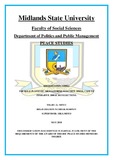Please use this identifier to cite or link to this item:
https://cris.library.msu.ac.zw//handle/11408/3626| Title: | The role played by media during election times: case of Zimbabwe 2008 & 2013 elections | Authors: | Moyo, Thabo G. | Keywords: | Elections Media Zimbabwe Politics |
Issue Date: | 2018 | Publisher: | Midlands State University | Abstract: | The research examines role played by media during election periods. It has found out that between the two political parties ZANU PF & MDC-T both received fair coverage though from different sources. Party ZANU PF had its politics covered by the Herald and other state funded media outlets like ZBC. Thus however ZANU PF proved to have more coverage since it had privatized the media at the cost of improved independent/ private media which was being suppressed during this time. The research has explanation and analysis on the different ways in which political parties and political figures were represented the print, broadcast and social media. The paper also observes the importance of media in persuading the masses towards a certain goal during election times especially when campaigning and launching manifestos, in a bid to lure votes. Research also paid attention to the influence of the new technology and its impact towards affecting the election results. The media laws leading to the election period 2008/2013 are also of significance in determining the degree of democracy within media environment hence promoting the peoples’ right to information and freedom of expression. The presence of repressive media laws has been attributed to the undermining of independent/private media thus left the people of Zimbabwe during elections to rely on one source of news which was through state media i.e. ZBC or Radio Zimbabwe. The paper also observes that media had great influence during the target period under review as evidenced by how political figures used social media to advertise themselves to the people and even mobilizing people for a particular event like campaign rallies or youth interfaces. Social media was most preferable to the politicians because of its reliability, affordability and time effectiveness of the platform in dissemination of any kind of news. Therefore, both negative and positive effects of media during elections were extracted by the paper. Effectiveness of the media was also traced from its early stages of print media till it had advanced through the use of internet, during 2013 Elections mobile and internet penetration rate were the zenith hence accessible to the masses as they were also affordable. Most of the population were mobile phone owners accessing internet and social media, this was a great wave of technological advancement which later promoted independent media through the channels of new media technology e.g. WhatsApp and Facebook. The roles of played by traditional media as the primary sources of news in the Zimbabwean context were also analysed in the research. | URI: | http://hdl.handle.net/11408/3626 |
| Appears in Collections: | Bachelor of Science Peace Studies Honours Degree |
Files in This Item:
| File | Description | Size | Format | |
|---|---|---|---|---|
| SILA 2018.pdf | Full Text | 916.22 kB | Adobe PDF |  View/Open |
Page view(s)
266
checked on Jan 28, 2026
Download(s)
150
checked on Jan 28, 2026
Google ScholarTM
Check
Items in MSUIR are protected by copyright, with all rights reserved, unless otherwise indicated.



